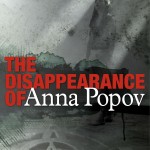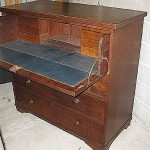
Rebecca Armstrong got out of the taxi and looked at the small sandstone cottage. It wasn’t what she had expected. I should have worn my jeans and a tank top, she thought, looking at her tight-fitting designer slacks, high heel shoes and crisp Chanel blouse. She adjusted her hair and, clutching her tiny two-thousand-dollar handbag, walked to the front door and rang the bell.
 ‘So, this is where the world-famous Aussie author lives,’ she said, following Jack into the cottage. ‘Interesting … Homes tell us so much, don’t you think?’
‘So, this is where the world-famous Aussie author lives,’ she said, following Jack into the cottage. ‘Interesting … Homes tell us so much, don’t you think?’
‘They do?’
‘About the people inside. Are you ready to give up your secrets?’
‘Secrets? What secrets? This is a bachelor pad. A bolthole and sanctuary wrapped in one. It’s all I could afford after the divorce. Sorry – I lost track of time.’ Jack took off his leather apron and laid it over the back of a chair. ‘I was just polishing an old secretaire out in the courtyard.’
‘You were doing – what?’
‘I’m restoring an antique. My booty from the little buying trip you so kindly allowed me to go on.’
‘Your friend was very persuasive.’
‘I did warn you about him.’
‘I’m a big girl.’
‘Here, I’ll show you. How did you like the Barrier Reef?’
‘It took my breath away.’
The back of the cottage opened into a small courtyard garden with a fountain in the middle. The small ornate desk stood on a drop sheet next to the fountain.

‘This is beautiful. What is it?’
‘A cedar secretaire, circa 1870, made by one of the early cabinetmakers of Sydney. Here, look at the trade label – “W. Jones & Son of Ross Street, Glebe”. Its opening is cantilevered forward and decorated with two blind drawers,’
said Jack, folding down the top of the secretaire. ‘There are three more drawers under here – see – supported by two turned full columns. There should also be a secret compartment somewhere in there. I was just trying to find it when you arrived.’
Rebecca held up her hand. ‘Stop it,’ she said, laughing. ‘You sound like one of those judges on the Antiques Road Show.’
‘Sorry. That’s collector’s speak, I’m afraid. I don’t notice it anymore.’
 ‘You’re a dark horse, Jack Rogan.’
‘You’re a dark horse, Jack Rogan.’
‘I like working with my hands. I collect antiques, mainly early Australian colonial furniture. When I can afford it. Ah, here it is,’ said Jack, exploring the back of one of the drawers with the tips of his fingers, ‘the secret compartment. There must be a brass spring somewhere in here, and a knob. Yes! You pull it out,’ he said. ‘Who knows what treasures are hidden within?’
‘How exciting!’ Rebecca reached inside and carefully pulled out the little cedar drawer. ‘Empty, I’m afraid,’ she said, holding up the exquisite little box.
‘Not quite,’ Jack said. ‘There’s something tucked into the corner here. Well, what do you know? Look at this.’ He held up a silver bracelet and began to polish it with his handkerchief. ‘Here, have a look.’ He handed the bracelet to Rebecca.
‘How romantic. If only it could talk,’ she said, holding it up to the light.
‘Perhaps it can. Look over here. There’s an inscription on the inside.’
‘What does it say?’
‘One word – Örökke. How strange. I wonder what it means.’
‘Could it be a name, you think?’
‘No idea. It really doesn’t matter, I suppose,’ continued Jack. ‘I want you to have it. Here, let me put it on.’
‘I couldn’t possibly, Jack. It’s yours …’
‘Don’t be silly.’ Jack reached for her wrist. ‘I insist. There, it’s done. Look. A perfect fit.’
‘That’s very sweet of you, thank you.’ She gave him a peck on the cheek.
‘And thanks for the party,’ said Jack. ‘Come on, let me show you around.’

‘You have some exquisite pieces. What’s this?’ asked Rebecca, running her hand over the gleaming surface of a cedar chest with brass corner plates and brass handles.
‘You have a good eye. This is one of my best pieces. A campaign chest.’
‘What, for going to war?’
‘Not quite. Governor Fitzroy commissioned a Sydney cabinetmaker, Andrew Leneham, in about 1860 – the same year, incidentally, this cottage was built – to make specimen boxes for the presentation of gold samples to Queen Victoria. This is one of them. Gold was discovered in New South Wales in 1851.’
‘How fascinating. And this?’
‘This is a writing slope. A kind of portable desk, also made of cedar. It’s mitre joined at the corners here, with recessed brass carrying handles. It has internal compartments for writing utensils and documents. It also has a secret compartment – here. To hide love letters and gold coins.’
‘Drum roll, please. And now comes the surprise; its value? What’s it worth?’ teased Rebecca.
‘You’re making fun of me. Am I boring you?’
‘Not at all,’ said Rebecca, putting her hand reassuringly on Jack’s arm. ‘You have quite a collection.’ Rebecca pointed to the painting above the chest. ‘This is fabulous. What is it?’
‘Brett Whiteley. Do you like it?’
‘Fascinating. Antiques and modern paintings. Polished wooden floorboards and sandstone walls. Not at all what I expected.’
‘What did you expect?’ asked Jack, handing Rebecca a glass of wine. ‘Homes tell us so much …’
‘I can’t really say. But not this …’ she replied.
‘You know, this is the first time we’ve had a conversation like this since you took me under your wing,’ said Jack quietly. It had been just over three months since his New York publisher had introduced him to Rebecca Armstrong. It was an unlikely fit. The tall, lanky, suntanned Australian larrikin first-time-author with the funny accent, and the elegant, sophisticated New York PR agent representing several well established writers on the bestseller list. Faded jeans and leather jackets met Hermes and Cartier; the experienced New Yorker taking on the rookie from Down Under. Yet, somehow it worked. It worked, because Jack had written an exceptional book and genuinely needed help in dealing with his success and sudden fame. Rebecca found his inexperience endearing, and his willingness to listen to her advice strangely flattering. And there was one more thing: it was exciting to be around him.
‘You know a lot about me. But I know very little about you,’ Jack said. ‘That’s not quite fair, don’t you think?’
Rebecca laughed. ‘What do you want to know?’
‘Surely you didn’t just pop up out of nowhere one day as a successful businesswoman in New York? You must have somehow clawed your way through that treacherous jungle first.’
For a while she looked at him pensively.
‘Where did you come from, I wonder?’ Jack asked, reaching for her hand.
Rebecca wore large glasses, giving her an endearingly studious look which didn’t quite go with the designer labels and expensive French accessories. Jack suspected this was deliberate. Somehow, the glasses always stood out. She had several pairs to suit different occasions, just like handbags and shoes. That afternoon, she wore an old-fashioned tortoiseshell pair that kept sliding down her nose. She kept pushing them back up with her index finger while pursing her lips.
‘That’s quite a question. Have you heard of Lancaster County?’ Rebecca asked.
‘Pennsylvania. Amish territory …’
‘Well informed, as usual.’ She nodded appreciatively. ‘My maiden name was Stolzfus. I grew up on a small farm outside Philadelphia with my three brothers. We had no electricity, no television, radio or kitchen appliances. Musical instruments were forbidden and cars not allowed.’
‘Buggy?’ interrupted Jack.
 ‘Right again. We spoke Pennsylvania Dutch and our only transport was a horse-drawn buggy which took us to the markets in Philly once a week with our produce – eggs and fresh vegetables. I tended a small stall with my mother in my long black dress, apron and starched white bonnet.’
‘Right again. We spoke Pennsylvania Dutch and our only transport was a horse-drawn buggy which took us to the markets in Philly once a week with our produce – eggs and fresh vegetables. I tended a small stall with my mother in my long black dress, apron and starched white bonnet.’
‘Very cute. I can just see you …’ Jack teased.
‘My brothers were all carpenters making furniture in the barn behind our house when they didn’t work in the fields,’ Rebecca continued, undeterred. ‘Mother and I made quilts in the evenings by candlelight. My father had a long beard but no moustache – that too was forbidden – and always wore a straw hat and baggy black trousers held up by braces.’
‘And I’m supposed to be the dark horse here …’ interjected Jack, refilling Rebecca’s glass.
‘Fun was a barn-raising with lots of laughter, prayer and games, and enough food to feed the entire county for a year. It was a community event. You know, everyone pulling together to help a neighbour. That’s where I met Amos …’ Rebecca paused and turned away, her eyes misting over. It only lasted for an instant, opening a tiny crack in her otherwise carefully controlled demeanour.
‘Amos?’ asked Jack.
‘My first husband. We fell in love and ran away, leaving everything behind …’
‘First husband?’
‘I haven’t been lucky with men …’
Jack sensed it was time to change the subject. ‘I ran away too,’ he said. ‘As you know, I left a Queensland cattle station for the big smoke. I started out sweeping floors and running errands for a Brisbane newspaper.’
Appreciating his tact, Rebecca looked at Jack and smiled. There’s a lot more to this guy, she thought, than he lets you see. ‘And I started out as a receptionist, working for a fashion magazine in New York …’ she said.
‘The Devil Wears Prada stuff?’
Rebecca chuckled. ‘A bit like that, but without the free clothes. You saw the movie?’
‘Loved it.’
‘What was it like? Growing up on a cattle station?’
Jack took his time before replying and looked pensively at Rebecca. ‘Lonely and harsh,’ he said. ‘I learnt to ride before I could walk and helped around the house as soon as I could stand. Our closest neighbour was 50 miles away, and it took three hours on a good day to reach town in the old ute. I used to ride in the back with Bonny and Clyde.’
‘I thought you had no siblings,’ interrupted Rebecca.
Jack began to chuckle. ‘Bonny and Clyde were our cattle dogs. Sharp as tacks. They were my friends. Our enemy was the drought. It was never far away,’ said Jack, turning serious, ‘and when it came, it lasted for years. That’s when the land became a dustbowl, the cattle began to die, and the bank manager came knocking.’ Jack looked away. ‘Mum hated it with a passion. She was a country girl from Wales. She married my father when she was just eighteen …’
Realising that she had opened old wounds, Rebecca reached across and put her hand on Jack’s. ‘What happened to your parents?’ she asked.
‘Mum left. One day, she couldn’t take it anymore and ran off with the publican in town. We never saw her again. And then I ran away too,’ Jack said, the sadness in his voice reflecting the heartache of painful memories. ‘Dad eked out a living on the cattle station with three Aboriginal stockmen until he got sick …’
‘What happened to him?’
‘He lost the farm and died a broken man in a boarding house in Townsville a few years ago.’
‘I’m sorry.’
‘Such is life,’ said Jack, reaching for his wine glass. ‘We all have to follow our own path. Often barefoot, and some of it is treacherous and paved with nails.’
Rebecca squeezed Jack’s hand. ‘Your divorce?’ she asked, changing direction.
‘Messy, like all of them.’
‘Girlfriends?’
Jack shrugged. ‘Girlfriends? Are you kidding? With my diabolical schedule? I couldn’t keep a canary in a cage …’
‘Interesting comparison …’
‘You know what they say: a rolling stone gathers no moss.’
‘Poor boy … But it wasn’t always that way. What about that policewoman in your book?’
‘Jana?’
Rebecca nodded, watching Jack carefully.
‘She was an old flame. You can’t ignite old flames; it doesn’t work. The spark isn’t there anymore,’ Jack said pensively. ‘In the end, she fell for the other guy.’
‘Marcus Carrington, the lawyer …’
The look on Jack’s face told Rebecca it was time to back off. ‘We’re still friends,’ said Jack. Rebecca wasn’t convinced. ‘Now, let me show you something interesting …’ Jack pointed to a curious piece consisting of three wooden steps leading nowhere.
‘What on earth is that?’ asked Rebecca.
‘Bed steps. That’s how you climbed into the feathers in the good old days. The top step here opens up – see – for your jewellery and personal stuff. But the really important part was this.’ Jack opened the second step and pulled out a lidded commode seat.
‘Is this what I think it is?’ asked Rebecca, a sparkle in her eye.
‘Sure is! The chamber pot is over there,’ said Jack, pointing to the window sill. But enough of the tour. How about some dinner?’
‘I was beginning to think you’d never ask.’ They linked arms and strolled down the corridor towards the kitchen.
‘Unlucky with men, eh?’
Rebecca nodded.
‘A woman like you? You’re obviously looking in the wrong places,’ said Jack.
‘Looking under stones would be a wrong place then?’
‘Definitely.’
‘Thanks, Jack. I’ll keep that in mind.’
‘I promised to cook for you, remember? Well, this is your lucky day.’
‘I’m sure it is. You’re the first man who ever offered to cook something just for me. I can’t wait.’
‘You may be sorry.’
‘I doubt it.’
‘Amish, eh? You’d be used to plain tucker then …’ teased Jack, opening the door to the kitchen.
‘We may be known as the Plain People, but the food, I tell you, was never plain.’
‘Neither is my cooking; follow me.’
PS Don’t forget to visit us again next Friday for your next instalment of The Disappearance Of Anna Popov. Or better still, may I invite you to sign up for our blogs, Letters from the Attic, and you will be notified when a new one is due. That way, you will never miss out!




